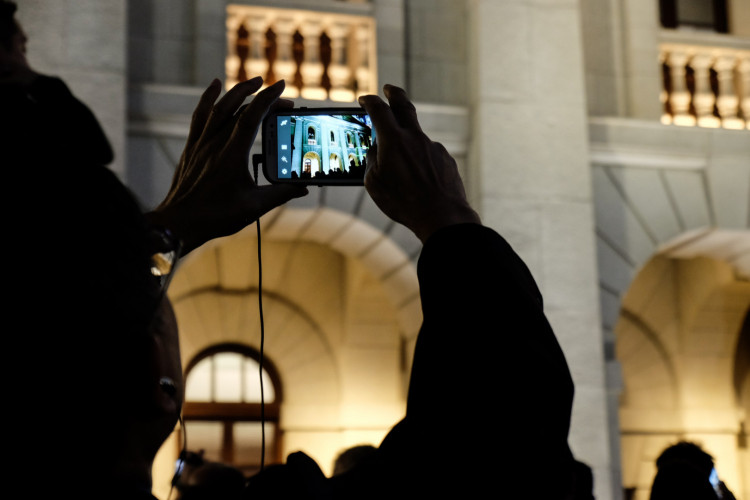Police arrested three former pan-democrat politicians Wednesday for disorderly behavior during a legislative meeting in May.
Mainland officials have warned of consequences for "anti-China" behavior.
Earlier this year, opposition members Ted Hui, Eddie Chu and Raymond Chan attempted to delay the passage of the now-approved national anthem ordinance, which made insulting the Chinese national anthem a chargeable offence.
The trio splashed strong smelling liquids and rotten plant matter in the legislative assembly's main meeting room - incurring a HK$250,000 cleaning fee and the ire of pro-establishment officials in the process.
"Hong Kong's administrators must be patriots," said Zhang Xiaoming, deputy director of the PRC's Hong Kong and Macao Affairs Office, on Tuesday morning at a legal forum celebrating the 30th anniversary of the city's Basic Law. "People who are anti-China...must be kicked out."
Several elected officials have already been given the boot. Last week, four opposition lawmakers were disqualified after the National People's Congress Standing Committee (NPCSC) in Beijing passed a resolution requiring "patriotism" from Hong Kong's Legislative Council members.
"What was notable was that the NPCSC referred to the PRC Constitution, and not to the Basic Law," Dr. Alvin Cheung told Business Times on Wednesday. "This is a distinct departure from the NPCSC's previous practice, and bodes extremely poorly for the future prospects of the Basic Law."
The city's legislative branch is now without an opposition bloc, making it unable to carry out the checks and balances on government authority that had previously slowed the passage of Beijing-backed legislation.
Hong Kong chief executive Carrie Lam said that she had invited the People's Congress to resolve a constitutional issue that Hong Kong could not solve on its own.
"I would not accept Lam's remarks at face value," Cheung added. "As we have repeatedly seen, the NPCSC has been willing to intervene to preempt, or to reverse, litigation in Hong Kong."
Three Decades On, China Threatens Judicial Reform
At a legal summit Tuesday to celebrate the 30th anniversary of the Hong Kong Basic Law, mainland officials and members of the city's pro-establishment government were keen to look forward - not back - with judicial reform frequently discussed.
"Even [though] western countries' judicial systems have been reformed constantly, this does not affect their judicial independence," Zhang said and called for Beijing's "comprehensive jurisdiction" over Hong Kong to be respected.
Although he did not delve into specific reforms that might be enacted, "we must defend the city's rule of law and we must also safeguard the national constitutional order," the deputy director noted.
Hong Kong's place in this constitutional order is laid out by the Basic Law, according to legal experts. "Legally speaking, the PRC constitution and the Basic Law resemble the relationship of mother and son," Hong Kong barrister Alex Fan told Business Times.
"The Basic Law is the legal instrument manifesting the PRC's state power to establish a Special Administrative Region," the lawyer added.
Separation of Powers Comments Stir Debate
Speaking at the anniversary event Tuesday, deputy director of the Hong Kong Basic Law Committee Maria Tam Wai-chu said that Hong Kong has been executive-led since the beginning and has no separation of powers between the executive, legislative and judicial branches.
"To assert that HK has no separation of powers at all is simply not true," Cheung noted. "I suggest that Tam, and others, are deliberately conflating 'separation of powers' with 'judicial independence', with a view to undermining the latter."
Pro-establishment figures like LegCo member Regina Ip spoke out against the issue as a matter of debate at all. "Why are Hong Kong judges so obsessed with separation of powers?" the lawmaker wrote in a Nov. 4 blog post.
Ip's opinion is echoed by others in the legal community. "In my personal view, it is a futile exercise to debate whether the doctrine of separation of powers apply to HK or not," said Fan.
Given that any hint of anti-China sentiment has been eradicated from Hong Kong's executive and legislative branches, it is understandable that the city's judiciary has become the last battleground for both sides of the debate.
Up until recently, its sanctity was regarded as relatively impregnable; "Article 2 of the Basic Law clearly states that the Hong Kong SAR enjoys independent judicial power," a government representative said as recently as September of this year.
But as Cheung concluded, "it should by now be apparent that the Basic Law simply means - to paraphrase longtime Hong Kong observer Suzanne Pepper - whatever Beijing wants it to mean, whenever Beijing wants it to mean it."





